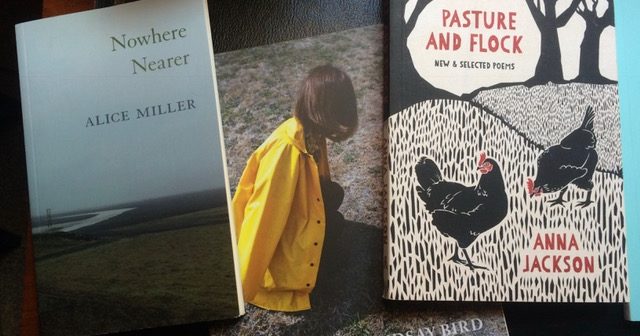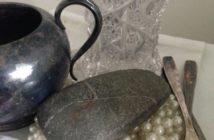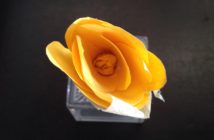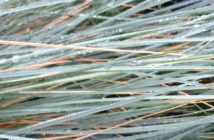Over the last few months I have had the pleasure of reviewing several new collections of poetry by some well known contemporary poets. Ahead of National Poetry day on Friday 24th August, I thought I would share a few highlights from these volumes. 
Pasture and Flock by Anne Jackson
In the poem ‘Unknown unknown’ Jackson perfectly caught the creeping doubt we have about how much, or little, we know about people:
“any more than the poet’s biographer,
revealing everything he’s told,
accounting for contradictions
in accounts, gaps in the paper trail,
can know where the poet goes at night
when even his wife, lying beside him
in the dark, can’t know where he goes
in the privacy of his mind;”
In part two there is a short series of poems about a female photographer; The pretty photographer, The photographer’s hallway, The photographer in the Library, and The photographer’s Olympics. Four poems over six pages open a window on the life of the photographer, tell us so much about her; likes and dislikes, daily life. I love the feelings that I am left with. Happy to have known her briefly, wishing that I could meet her and talk about the pictures in her hall.
There are 25 poems in the final section. Classical references to Horace and Sappho, James K Baxter and barnacles, hens and the ever present ghosts which lurk everywhere in this collection. I loved ‘Aline, waiting her turn’ about a young poet “hunched in her hoodie”, waiting for an old poet on stage to finish her performance. The old poet says “no one is old until it happens” and,
“that makes the young poet grimace,
because you are old, it has happened and long
ago she thinks, waiting to take her place.”
He’s so MASC by Chris Tse
In Chris Tse’s collection of 43 poems, I was struck by the variety and interplay of amusing observations and sometimes sad laments. The everyday and the ordinary alongside the extraordinary and the beautifully phrased.
Chris Tse obviously has a great sense of humour and I particularly loved his poem called I was a self-loathing poet. He treats the confession of being a poet rather like you would if confessing to being gay, becoming involved with another poet who instructs him that he needs to tell his parents. In the closet world of poets his new friend “impressed me with gossip about acclaimed novelists who were secretly writing poems on the down-low”. His mother suspects, “She would ask me if I was reading any good novels and I would respond with something vague.”
Tightrope by Selina Tusitala Marsh
This poet is not afraid to confront us, such as with ‘In Creative Writing Class’ which portrays the ignorance of the pakeha man and his envy of the work of Pacifica women who can draw upon their oppression while all he can offer is “… staid, North Shore-ish lukewarmish gumboot tea”. A cry against the cliché and how terrible it sounds to be called “North Shore-ish”.
One of my particular favourites was ‘The Working Mother’s Guide to Reading Seventy Books a Year’ which challenges our time-poor lives to find more time to read a book. This really resonates for book reviewers.
Don’t have babies
Don’t have a full time job
Don’t be working class
Don’t be time poor and extended family rich
If you have babies, don’t let them play sports
Definitely don’t let them play an instrument
(extramural activities increase peak-hour traffic commuting time)
Instead there is a list of Reads, such as “Read one-handed in the line at Countdown”. There is no mention of writing as well, finding time for children, family, job and your own writing. Perhaps that would be a step too far.
Selina Tusitala Marsh is our poet laureate, last year, this year and next year. I enjoyed the accessibility of these poems, there is something for everyone, be it walking a tightrope between the Twin Towers or going to the Auckland Nines with its carnival of costumes. I enjoyed her celebration of the Pacific writers who have gone before her and all the promise of more great words to come.
Nowhere Nearer by Alice Miller The poem ‘Fourteen Mistakes’ left a lasting memory. It starts with a quote from Razumikhin, a drunken character in Dostoyevsky’s Crime and Punishment, “You never reach any truth without making fourteen mistakes”. Fourteen numbered fragments follow, some only three lines long, but together forming a whole life. Here are three that I found particularly poignant:
2.
How we moved to new cities
and wrote our addresses in loose font
on the back of every envelope from
every drawer in every office we visited from Auckland to
Brooklyn to Hackney
and spoke our names
only with accents formed
in locales we’d lately visited
so no one could guess what we were
9.
And when an architect asked
to build a garden inside us
we pried ourselves open and let him in
until we were filled with paths and gates
we did not own the maps for
10.
And when we realised the architect had left for good
how proud we were still to’ve been
an acciaccatura to his chord
The word acciaccatura had me reaching for the dictionary – it is a musical term meaning a grace note that is performed as quickly as possible before the essential notes of a melody.
Hera Lindsay Bird by Hera Lindsay Bird
Hera Lindsay Bird appears to be the current ‘enfant terrible’ of New Zealand poetry. Her verse may not be to everyone’s taste, and if her book were a film it would come with the R18 warning ‘contains sex scenes and bad language’. There are some real gems in here, although it is not a collection for the faint hearted or those that get annoyed by something sweary.
The first verse from ‘The ex-girlfriends are back from the wilderness’ is one of the most pleasing for me:
“The ex-girlfriends are back…
emerging once again from the tree shadows…
into the primordial burlesque of autumn
with their low-cut…
reminiscences… and soft dubious ironies…
trembling once again into their
opulent…
seasonal migration patterns
a corsage of wilting apologies
tethered to the bust…”
The imagery and the language combine beautifully to hint and suggest at themes which Bird tosses back and forth in the rest of the poem. It is a poem of strength – she is not letting those ex’s intimidate her.
One final gem from the bright sparkly box of trinkets. From ‘Planet of the Apes’ come the lines;
“I’ve always never felt this way about anyone
but the way in which I’ve never felt about you
is a way of never feeling so new it’s somehow old
like a cave painting of a fax machine.”
Young Country by Kerry Hines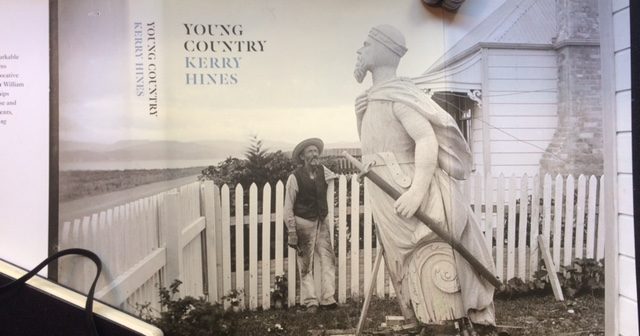
One final collection, which is actually from 2014 but which I only just bought for myself. It is as much about the pictures as the words.
The joy of this book really comes from the positioning of the old photographs and the poems which they inspired. The photos were all taken in the 1880s and 1890s, when New Zealand as a country was very young and parts were newly settled. There are some wonderful shots of a house on Cuba Street Wellington with the three men who lived there standing in the back garden. Looking carefully at the pictures or referring to the notes at the back of the book will reveal that the same house appears from both the front and the back, and the inhabitants are the heroes of the first section of poems.
The photographs were all taken by a man called William Williams and are part of the New Zealand national archive, The Alexander Turnbull Library. Kerry Hines has brought them to life with poems and woven fact and fiction around them.
Marcus has provided a new and unread copy of Anna Jackson’s “Pasture and Flock” as a reader prize for August on ARTbop. Email ARTbop at info@artbop.co.nz heading your email Hobson’s Choices NZ Poetry Competition and tells us the musical term mentioned in Marcus’ article to be in the draw for the copy of “Pasture and Flock” Competition closes at 12 noon on 1st September 2018
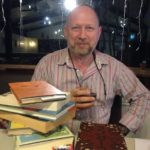
ARTbop Editor, author, book reviewer at the Black Sheep with a pile of poetry books for alchemy earlier this year
Marcus Hobson is the ARTbop Contributions Editor, regular book reviewer and writer. An aspiring author of both novels and reviews Marcus relocated to the Bay of Plenty from Auckland. He has in the past done such varied things as study ancient and medieval history, worked as an archaeologist, as an economist in central and southern Africa, and as truck driver in a quarry. Marcus is a lover of art, the written word and a full-time fanatical book collector, with over 3,000 volumes on his shelves. He lives close to Katikati with his artist wife and their three daughters, two cats, a library and the odd chicken. Marcus is currently working on a “factional” work about World War One and works of fiction and poetry. With Dhaivat Mehta he has also been supportive of ARTbop’s efforts to establish alchemy a spoken word poetry gathering at the Black Sheep Whakamarama.
ARTbop promotes
(or we think you should check this out!)
ARTbop is promoting poetry in the Western Bay of Plenty
NATIONAL POETRY DAY 24TH AUGUST 2018:
I’ve seen at least four open events on around the Western Bay sub-region to celebrate National Poetry Day. Just in case you think that National Poetry Day is limited to the Bay of Plenty I’m including links to the nation-wide event page for Phantom Billstickers National Poetry Day 2018 and also a link to NZ Poetry Shelf: you’d be surprised how many poets there are!
http://www.nzbookawards.nz/national-poetry-day/calendar-of-events/
https://nzpoetryshelf.com/page/15/
Well-known Tauranga slam poet Dhaivat Mehta has organised an open mic session of Incantation at the SOMA Studio art and performance space 6 – 8pm on the 24th. Check out the Incantation facebook page https://www.facebook.com/events/511371299285228/
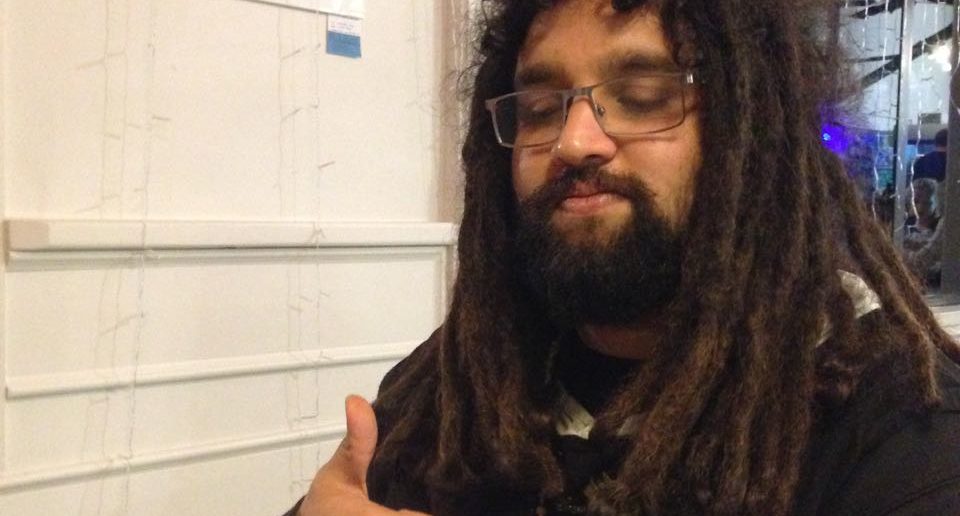
Tauranga slam poet and alternative spoken word poet Dhaivat Mehta
Dhaivat Mehta and Kingsley Smith have collaborated to created a spoken word and music project which you will find titled Tryptofunk. Here’s one of the series from their YouTube channel: Please note some language may offend.
THE AFFORDABLE ART & ARTISAN FAIR AT THE BLACK SHEEP WHAKAMARAMA
The Fairs are held within the Black Sheep Cafe & Restaurant complex on the last Sunday of every month (on the 16th in December 2018) 11am to 3pm. There is heaps of parking, clean toilets and wonderful food and coffee. There’s live music. There’s an event prize you can win. If you would like to join us as an exhibitor/retailer of your original creativity or artisan products you can contact us at aaafair17@gmail.com
We are sign posted along SH2 with signage to the turnoff of SH2 and Plummer’s Point Road. You won’t be able to miss us! And check out Birgitt Shannon’s video of the July Fair: each month Birgitt, a talented Kati Kati artist interviews two or three of the Fair’s participants and exhibitors. (Details about Birgitt and her own website, YouTube channel and arts practice at the conclusion of this article) Here’s just a taste of what you’ll find. We’re indoors over winter months and outside in the Summer!
Birgitt Shannon: Katikati based artist Birgitt Shannon is a regular contributor to ARTbop. Birgitt is also the principal Event Organiser of the Affordable Art & Artisan Fair at the Black Sheep Whakamarama – a collaborative community not for profit venture by ARTbop and the Black Sheep. Birgitt creates a monthly YouTube interview series with the Fair participants: Art by Birgitt YouTube. On her channel you’ll find images of her work, interviews with local creatives and projects Birgitt has been invited to be involved with. You can also see Birgitt’s work online and at the AAAFair on the last Sunday of every month. Birgitt has her own website at www.artbybirgitt.com
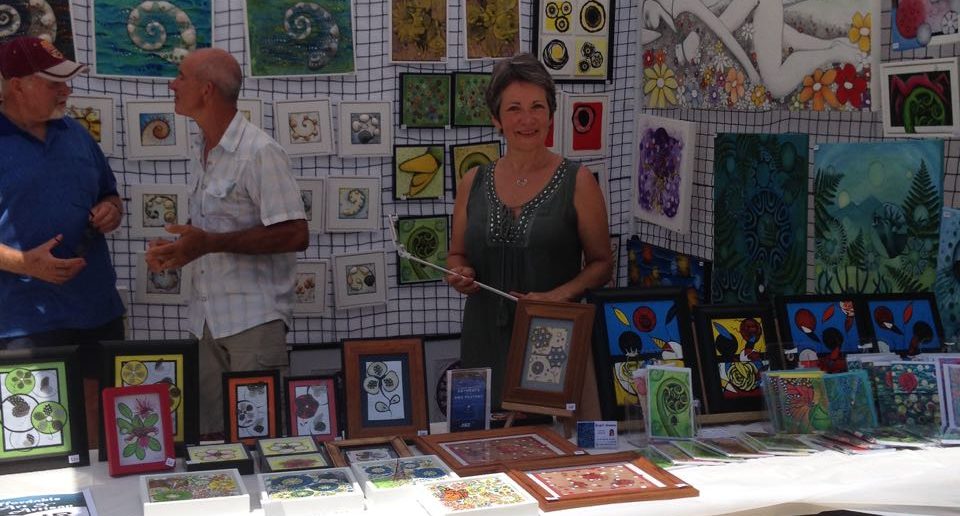
Birgitt Shannon in her summer site at the AAAFair, Black Sheep,Whakamarama!


